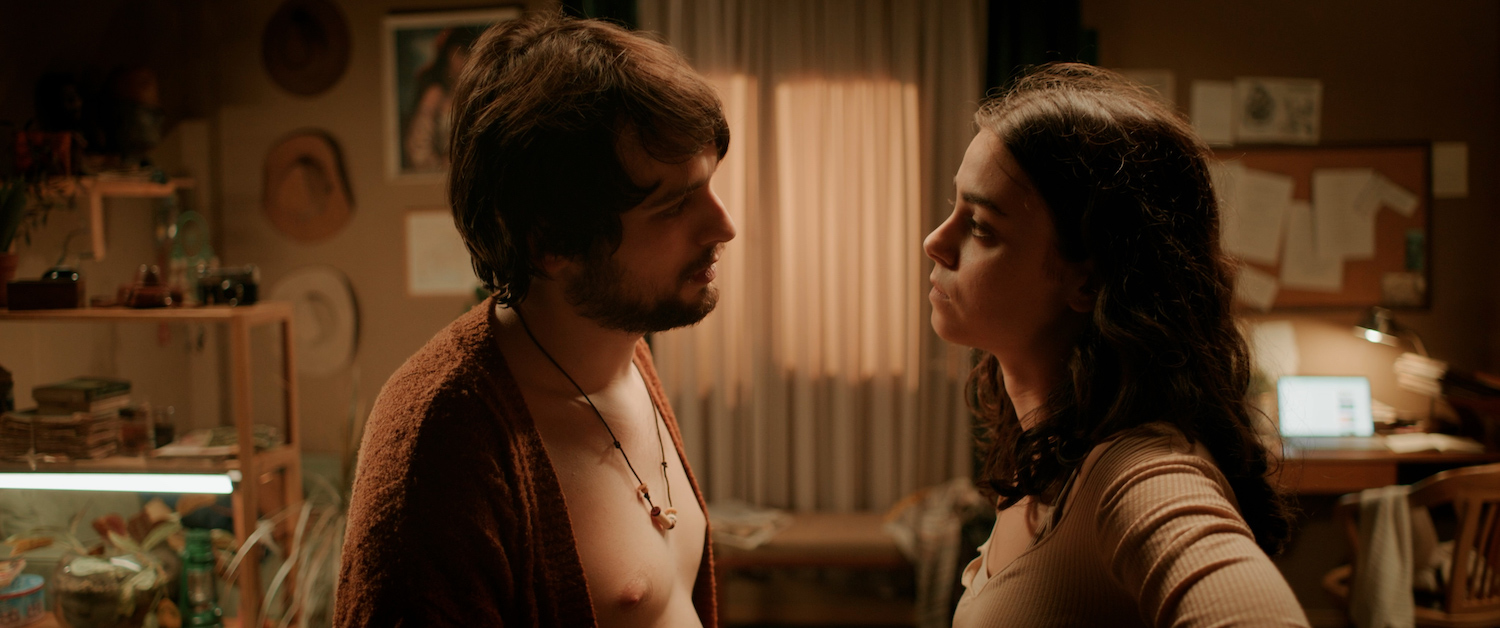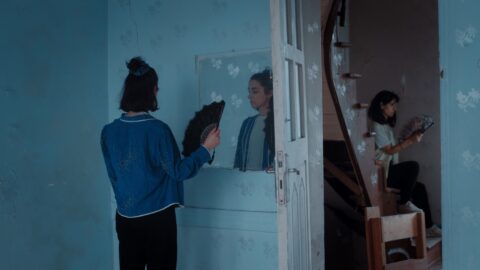The best way to make cinema accessible is probably just to make it free. Public screenings of shorts and documentaries at Antalya Film Festival — showing in the lecture-like Perge hall of the Antalya Culture Centre — are completely free of charge, meaning anyone can waltz in without spending a single lira.
I double-check multiple times when asking to pick up my accreditation, before meeting some vaguely familiar faces as we board into the shuttle — taking us past hotels with German names, generic beach bars and aparthotels; palm trees and the national flag lining the streets. Someone asks me who I write for. I respond for the first time: “I’m the Editor-in-Chief of Journey Into Cinema.” I’m out of Europe and into Asia, armed a new outlet and a new way of watching films.
I’m free. Free from the shackles of seeing and reviewing features — oftentimes 90 minute bores that merit a few sentences rather than the pain of a 500 word review. I’m free to sample the next generation, see what they have to offer quickly, then move onto the next thing. I’m free to watch two instalments of the National Short Film Competition.
Two Short Programmes
And if the festival promises a feast of national cinema — also spanning a documentary and feature fiction section — then the shorts (where I saw all but two films due to boring technical issues and misunderstandings) act as a tasting menu, sweet and sour confections that show the diversity and breadth of the vast, diverse and often contradictory country. While some countries point towards a house-style — often as much a result of who gets to tell stories and who ends up funding them — I found Turkish shorts refreshing in their individual idiosyncrasies, as much a reflection of the individual behind the camera as the context of their creation.
They span Kurdish stories, Syrian reminiscences, mountain dramas, expat stories and Istanbul comedy; culture clash, revenge, love, war and punishment; with styles that range from classical to self-reflexive, fast-paced to slow and steady. If the overall standard never reached mind-blowing heights, they provided stimulation, humour, dread and plenty of moral conundrums.
Together, Alone (Kasım Ördek) starts in the confines of a car, given an especially claustrophobic feel by the use of a 4:3 ratio. A young heterosexual couple are on a crime spree, stealing cars from unsuspecting foreigners. After getting away yet another time — an excellent shot shown from the back of the first car — the man remarks, “This isn’t Germany.” But it is still planet earth, with their getaway scuppered by a shocking reveal. Slowly expanding the angles inside and outside of the girl’s perspective as she deals with a moral reckoning, Ördek sinks the viewer into the chaos and darkness of their world.
But their pain is of their own making. For Ziko, the simple-minded man at the heart of the Kurdish film The Banishment (Yılmaz Özdil) — set as far away from Istanbul as it gets — he is being punished for an unspecified deed committed while sleepwalking. Banished by an unforgiving town into the deep, forbidding snow, he finds little solace from the other surrounding villages. While I couldn’t quite get how this interacted with the tale of an animal trapper, this is a fascinating look into what happens when tribal politics trumps national law.
While the law of nature prevails in The Banishment, the law of the streets certainly seems to rule the world of Not Today (Yağmur Mısırlıoğlu), with Meryem’s son refusing to explain why he is bleeding on the bed. She harasses him; he harasses her; all caught in close frames. This is a world away from her day job, babysitting the perfect child and taking the time to read a book on becoming the main character of her own life while she sleeps. Sadly, she is not, to quite startling consequences.
There is a danger in being the main character. Especially if you don’t want to be. In the formally-impressive yet crowd-pleasing Istanbul-tale You All & I Alone (Barış Kefeli), Deniz is the only person in the entirety of his housing block not to suffer from a blackout. While his neighbours light candles, he watches television, feeling increasingly guilty about his unexpected privilege. Soon he hides his own light — quite literally — the film playing around with the formal potential of lighting to stress his paranoia about his unique state. A strange class satire, and an effective one too.
Privilege is an annoyance and a source of paranoia for Deniz, but for İshak — posted to a remote Anatolian village for compulsory teaching duty in The Moisture (Turan Haste) — it is more of a curse. He’s the only teacher in the building, a place so old-school they burn wood to generate heat. Navigating unruly kids and divorce in this snow-capped, bleak landscape, his issues come to a head after the mysterious disappearance of a young girl. Basically Turkish True Detective (2014-) in miniature.

These films seem to spring out of their locations, the context of the world a key influence on the way people talk and act. But One Way (R. Hakan Arslan, Kerem Yükseloğlu) has its hero on a long-distance journey all the way through space, time and the contours of his own mind. Tasked with finishing a deadly blood feud, three interactions with hitchhikers force him to reevaluate his life. Here the weight of moral choices is properly considered, before finally being curtailed by an ingenious — perhaps cowardly — conclusion.
While the victims in the previous films did something to provoke the actions of their nemeses, Gülşah — the protagonist of hell is empty, all the devils are here (Özgürcan Uzunyaşa, above) — did nothing to invite in the sexual harassment of a famous actor while working backstage. But just when the film seems to settle into a trauma story, a self-reflexive, expertly-timed and framed tracking shot immerses her into a sideways metafictional layer; turning the story back and forth on its head several times. Channelling Birdman (Alejandro González Iñárritu, 2014) vibes better than Birdman, its madness transitions, Shakespeare quotations, and French New Wave affectations skyrocketed this clever and provocative film to the top of my list.
At this point in the programme, it appears the films became looser, more reckless, more formally ambitious: culminating in Tower (Emre Birişmen, feature image). A tale of cross-cultural dislocation that focusses on one woman’s decision to move to Berlin, and how that affects her relationship with her sister, its static frames, minimalist visuals and rhetoric-heavy conversations — so specifically rendered for that one relationship in particular — captured just the right level of emotion that the story needed.
But while Tower was rather affecting in its affectations, The Sheep (Benhür Bolhava) was too affected to be effective. Containing interesting ideas about the rural-city divide — often within the same space — this tale of a lost sheep felt a bit too obvious; teleported in from a broader-minded film festival. This incongruity was further stressed by The Syrian Cosmonaut (Charles Emir Richards) — the only documentary in the programme, exploring the life of the first Syrian to go to space and his rise from national hero to his history being purposefully erased by the Assad regime. Neatly animated and told with archive footage, this is certainly an interesting story, but it didn’t flow with the rest of the programme at all.
Certain films aside, the uniting theme, one supposes, is that every action has a consequence, and that consequence must be paid — not in cash, but usually something far worse. A sense of dread also pervaded many of these films, the vast majority of which skirted conventional conclusions in favour of enigmatic gestures. They exist as if to point you in the direction of a decision and then let you live in it, showing the potential of the short film to start a conversation rather than end it. Not in every case though: sometimes it just felt lazy.
And a Movie
Nonetheless, if the tasting menu was filled with delicious amuse-bouches, then the main dish should’ve been sent back to the kitchen. National Feature Film Competition entry Hara (Atalay Taşdiken) tells the story of a horse girl and her woes in such a Hallmark Movies manner it could easily be dubbed We Bought a Ranch. Using a telenovela-like approach to depicting her parent’s divorce and various squabbles over the ranch, including the potential loss of her favourite horse Turagay, the film boasts a decent idea and solid performances, but the execution — replete with scenes where they’re talking about someone who then walks in and says “Tell her what?” and piano music too on-the-nose for a drug commercial — was so generic it made me wonder what exact set of circumstances led to this being picked as the opening film of the national competition. The good news is that it probably gets better from here.
Redmond is the editor-in-chief of Journey Into Cinema.
